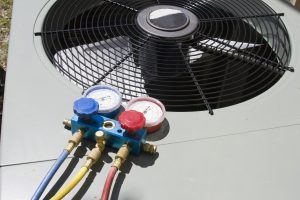As temperatures start to rise, your air conditioner becomes one of the most important appliances in your home. But if your system is showing signs of wear, underperforming, or struggling to keep your house comfortable, you may be wondering whether it’s time to schedule a repair – or if it’s time to replace your AC altogether.
What are the signs you need heating and air conditioning repair or replacement?
Common signs that you need heating and air conditioning repair or a full system replacement include:
- Rising energy bills despite normal usage
- Frequent breakdowns or repeated service calls
- Uneven temperatures or poor airflow in your home
- AC unit older than 10–15 years
- Strange noises or unusual odors coming from the system
Knowing when to hold onto your current system and when to invest in a new one can save you time, money, and a whole lot of frustration during the hottest months of the year. If you’re unsure where to start, this California homeowner’s guide to AC installation can help you weigh your options with confidence. Here’s a guide to help you determine whether your AC is truly ready for summer, or if now’s the time to consider a new AC installation.

1. Rising Energy Bills: A Sign Your AC Needs Replacement
One of the first signs that your AC is no longer running efficiently is a noticeable increase in your energy bills. If your usage hasn’t changed but your utility costs are climbing, your air conditioner may be working harder than it should to keep your home cool.
Repair or replace? If your system is less than 10 years old, a tune-up or targeted repair may restore efficiency. If your AC is older and your bills keep rising, investing in a new, high-efficiency system could offer long-term savings.
2. Constant AC Repairs
Are you calling your HVAC technician more often than you’d like? Repeated service calls aren’t just frustrating – they’re also a red flag that your system may be nearing the end of its lifespan.
Repair or replace? One repair per season might be manageable. But if you’ve paid for multiple repairs in the past year, or if the cost of repair exceeds 30–50% of the price of a new system, replacement is often the smarter financial decision.
3. Age Matters: Replace Your AC After 10–15 Years
Even with the best maintenance, most air conditioners have a lifespan of 10 to 15 years. If your unit is within or beyond that range, it’s likely no longer performing at peak efficiency and may be using outdated technology.
Repair or replace? Systems nearing 15 years are better candidates for replacement. Upgrading to a newer unit means better energy efficiency, quieter operation, and eligibility for current rebates or tax incentives.
4. Inconsistent Cooling: A Sign Your System Is Failing
Do some rooms in your home feel like a freezer while others stay stuffy and hot? Uneven cooling often signals airflow issues or a system that’s too small – or too old – to handle your home’s cooling demands.
Repair or replace? Minor issues like blocked vents or duct leaks can be repaired. However, if uneven cooling is persistent and your system is aging, a properly installed AC system in California can deliver even, reliable comfort throughout your home.
5. Strange AC Noises or Smells? Time to Replace
Grinding, rattling, buzzing, or screeching sounds are all signs something’s wrong inside your AC. Likewise, musty smells can indicate mold in your ductwork or unit, and a burning odor may signal an electrical problem.
Repair or replace? A technician can resolve some issues with a component replacement or cleaning. But if these problems are recurring or multiple noises arise at once, it may indicate your system is on its last legs—spring is the best time to prepare before the summer heat puts extra stress on your system.
Decide Now: Repair or Replace Your AC Before Peak Summer
Whether you need a quick fix or a full system upgrade, taking action now – before peak summer heat – can help you avoid mid-season breakdowns and uncomfortable days.
Frequently Asked Questions
Question: What are the key warning signs that my air conditioner isn’t ready for summer?
Answer: If your energy bills are climbing even with similar usage, or your AC is over 10–15 years old, or you’re dealing with frequent breakdowns or weak or uneven airflow, these are strong indicators that the system may be failing or inefficient.
Question: When should I repair my AC instead of replacing it?
Answer: If your AC is under ten years old and issues are limited to minor malfunctions, like jittery thermostat, dirty filter, clogged coil, or a short-term refrigerant leak, a targeted repair or tune-up often restores efficiency without a full replacement.
Question: How much repair cost is too much, when replacing makes more sense?
Answer: If the repair estimate is more than 30–50% of the cost of a new system, or you’re paying for repeated fixes, replacement usually represents a smarter long-term value given the expense and diminishing returns of constant repairs.
Question: Is AC age really a deciding factor in choosing replacement?
Answer: Yes. Most central AC systems last 10–15 years (even up to 20 years for well-maintained mini-splits). Once a unit is in that age range, it’s more prone to breakdowns and inefficiency, and upgrading often yields better performance with lower energy bills.
Contact RKM Heating and Air Conditioning today to schedule an appointment with us for AC maintenance. Done Right, Priced Right.

